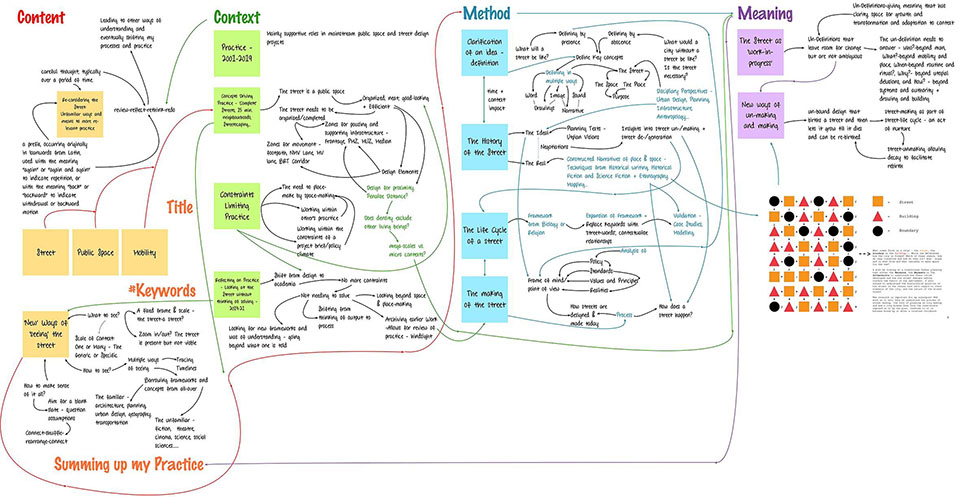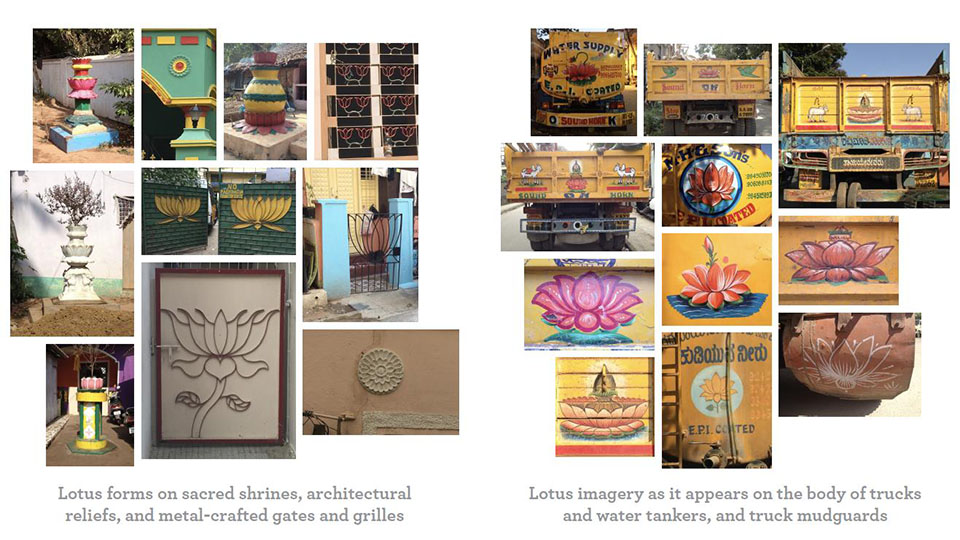“I do not want my house to be walled in on all sides and my windows to be stuffed. I want the cultures of all lands to be blown about my house as freely as possible. But I refuse to be blown off my feet by any.” - Mahatma Gandhi
"…in the Tamiḻ Poems, culture is enclosed in nature, nature is reworked in culture, so that we cannot tell the difference. We have a nature- culture continuum that cancels the terms, confuses them even if we begin with them" - A. K. Ramanujan
Overview
The goal of doctoral program at Srishti Manipal is to develop competency in high-quality and rigorous research in art, design and transdisciplinary studies with the view of making original contributions to these disciplines. The program encompasses a range of scholarly research, design, and creative production. It aims to build capacities for design, design education, art and art education that address problems and opportunities of contemporary society and are cognizant of India’s rich tangible and intangible heritage.
Program Structure
The 3-Year Doctoral Program at Srishti Manipal is a full-time program. It is organized, approximately, into three stages:
Stage One: Introductory, exploratory and open ended in nature, consists of course work and independent study.

At the end of Stage One the doctoral research proposal should be finalised and approved.
Stage Two: This period is one of research and practice; working in studios, archives, or in the field gathering data, engaging in practice and analysing texts in addition to reflecting and gathering notes. It is also a time when connections are made between the readings, literature and independent study in Stage One and the formal research inquiry that is part of Stage Two.

The full scope and sequence of the research is completed in this phase, allowing the doctoral aspirant to understand and express clearly the significance and value of their inquiries and the insights generated. Writing up reflections and analysis in peer reviewed journals, presenting work-in-progress as exhibitions or seminars are all a necessary part of this stage of inquiry.
Stage Three: The final and culminating stage is one of writing up the research in the form of a Thesis. Creative artifacts associated with the research may also need to be completed within this period. The Doctoral Program closes with an Open Synopsis Presentation and then the final examination.

Research, Participation and Collaboration
Events and Outreach
All Doctoral Scholars are encouraged to participate and contribute actively to events at Srishti Manipal including
- Graduate Symposium
- Graduate Research Conference
- Interlude/Interim/ UnBlock at Srishti Manipal
- Winter/Spring School at the Centre for Public History.
In addition to this Doctoral Scholars contribute to conferences, exhibitions and other events either organised by Srishti Manipal, by MAHE or by any of our partners. This contribution will include teaching opportunities too.
Research Guides
Srishti offers a vibrant ecosystem of researchers and practitioners who are engaged in uniquely combining practice, formal research and theoretical reflection to produce one of the kind and provocative artifacts, designs, propositions and scholarly works.
The scholars and researchers who are certified to guide doctoral research include
Anwesha Das
Anwesha Das mentors doctoral scholars in the field of literature, creative writing and Humanities. Her areas of interest include Black literature, Indian literature, history, critical theory, postcolonial studies, war literature, and creative non-fiction.
Asmita Sarkar
Asmita Sarkar’s research interests include contemporary drawing and painting, art-science collaboration, phenomenological aesthetics, visual and spatial thinking, and the philosophy of New Materialism. She is interested in guiding doctoral candidates in contemporary art and media.
Deepta Sateesh
Deepta Sateesh is interested in supervising doctoral candidates working in the areas of climate change, sustainable development and conservation, city and regional planning, environmental law and policy, the Anthropocene and decolonization, and living heritage and environmental education.
Gururaj K V
Gururaj KV mentors doctoral scholars researching in the areas of landscape, soundscape and urban ecology, ecological complexity, statistical and agent based modelling, biodiversity and conservation, natural history studies and citizen science.
Indira Chowdhury
Indira Chowdhury supervises research scholars in the area of oral history, institutional history and public history with a focus on urban change, landscapes and communities, history and culture of medicine and medical practices, gender and cultures of birthing practices, museums, materiality and cultures of display, oral history within cultures of orality and migration and identity.
Jyothsna Belliappa
Jyothsna Belliappa mentors researchers in the area of gender studies with a focus on work, education, identities, family and personal life. She has a deep interest in qualitative research methods and in women's safety in public and professional spaces
Keya Chakraborty
Keya Chakraborty guides Doctoral scholars researching in the areas of transitions studies, sustainable and inequality studies, issues related to environment and climate change, socio-economic-human development, public policy and governance.
Kiranmayi Indraganti
Kiranmayi Indraganti guides research in film practice, visual culture, performance and politics, technology and culture, methodologies of oral history and archives and film industry production processes.
Kush Patel
Kush Patel welcomes doctoral candidates who are interested in pursuing research in the areas of queer-feminist technology and cultural studies; critical digital humanities praxis and pedagogy; community archives and public history; architecture, infrastructure, and the city with a focus on gender, participatory politics, and social production of space.
Mamta Sagar
Mamta Sagar mentors doctoral scholars in the areas of comparative literature, translation studies, feminism, postcolonial and cultural studies, nationalism and identity politics, literary histories, literature and literary expressions, women’s writing in India, Kannada literature, poetry and performance.
Naveen Bagalkot
Naveen Bagalkot supervises research in and across the areas of human-computer interaction, participatory & social and speculative & critical design, feminist ethics in technology and design, and science and technology studies.
Pithamber R. Polsani
Pithamber R. Polsani mentors doctoral research in the areas of modernism and modernity, decoloniality, philosophy, architecture, art and design discourses, literature and literary expressions.
Pooja Jain
Pooja Jain guides doctoral scholars in the areas of brand communication, advertising & marketing, strategic design practices, consumer behaviour & psychology, speculative brand futures, visual persuasion & expression, brand theories & creative approach, typography in multi-contextual design, new media, socio-political-cultural design inferences, technology & innovation, and immersive design strategies.
Sanjukta Ghosh
Sanjukta Ghosh mentors doctoral scholars researching in the area of sentiment analysis through various classification models and deep learning techniques. Her research practices lie in the field of human behavior, innovation through creative cognition, design thinking and multi disciplinarity, traditional knowledge and local economy, mental well-being and quality of life through effective empowerment.
Sonal A Godhania
Sonal is interested in guiding students in areas such as AI tools in education, stock market economics, blockchain, NFTs, metaverse and future of these technologies, application of strategic management theories in MSMEs and dynamic capabilities in pedagogic institutions.
Srivi Kalyan
Srivi Kalyan is interested in guiding doctoral candidates in the areas of artistic research, ecological consciousness, Indian ecological aesthetics, eco-philosophy, creative practice & philosophy, art & design pedagogies, and transition studies.
Vasanti Mariadas
Vasanti Mariadas guides research in the areas of, film studies, contemporary art, ecosophy and critical theory and particularly, modernism, postmodernism, poststructuralism, phenomenology, psychoanalysis and postcolonial studies.
Collaborations
In addition to being mentored by research guides, the doctoral scholars are strongly encouraged to locate their practice in wide range of Labs and Centres at Srishti Manipal. Some of which include,
Kabir Project curated, translated and re-expressed poetry and music through documentary films, folk music concerts, urban festivals, travelling rural yatras, school workshops, exhibitions, college curricula and a large web archive called ‘Ajab Shahar’ which is open to all. Click here to know more >>
Srishti Films exposes scholars to the contemporary debates and issues in the field of environment and development, broadening their horizon beyond fiction, to understand and negotiate the complex and constantly changing world of documentary films. Click here to know more >>
Impact Edge seeks to converge design, business, and social impact through entrepreneurial activity. It is envisaged as an incubator-accelerator where ideas are explored, concepts tested out and enterprises accelerated. Click here to know more >>
Centre for Public History takes on the challenge of interpreting the past and working with history outside of academia. It works with people’s experiences of the past to create a new understanding of history. Click here to know more >>
Srishti Labs is the fertile ground for researchers, educators and creative practitioners to inquire and collaborate across domains and expertise in order to create knowledge, innovate and push boundaries. Click here to know more >>
The UNESCO Chair in Culture, Habitat, and Sustainable Development is an institutional research-based initiative with the agenda to promote the safeguarding and management of tangible and intangible cultural heritage as well as promote cultural diversity. Click here to know more >>
Additionally, there are other Labs and Centres at Srishti Manipal that provide research opportunities to doctoral scholars. Information about them can be accessed here >>
Enquiry
For more information, write to phd.smi@manipal.edu
FAQs
There are three factors that make our Doctoral Program unique
- The program is set within a rich ecosystem of Srishti Manipal with practitioners, scholars, artists, designers and others who provide inspiration, support as well as a space to build, collegially, ideas.
- The program values practice and reflection on practice as the start to the doctoral journey. The final submission may include creative artifacts produced during this period which could support and validate the doctoral thesis artistically.
- The program is transdisciplinary and hence opens the doors to research that is collaborative and could be transformative too.
A Doctoral proposal is a structured document developed under the mentorship of a scholar’s Doctoral Advisory Committee (DAC) that clearly articulates her/his research topic, knowledge of the area of research, timelines and the nature of outputs. The proposal must be approved by scholar’s DAC and a university level committee before a scholar can be formally registered to the program.
It is not necessary, but we strongly encourage the candidates to have developed a clear understanding of an area of research that they would like to pursue during their doctoral studies. The topic of research can be decided at the time of writing the proposal mentored by a guide and members of Doctoral Advisory Committee (DAC)
Yes. The doctoral scholars are required to do course work that includes a courses on research methodology and research ethics.
A scholar enrolled in the Doctoral program should spend minimum of one semester in the program from the date of enrolment before submitting the PhD proposal.
A DAC is a committee responsible for guiding the scholar through their research and thesis. The DAC consist of a Guide ( certified by MAHE) and two Subject Matter Experts (SME).
Scholars can choose a guide from a list of certified guides, all of whom must be full-time employees of Srishti Manipal / MAHE.
Yes from the faculty of Srishti Manipal and MAHE.
Based on the nature of research requirements a doctoral scholar may choose to have a co-guide. Both the guide and co-guide must be certified to guide the program by MAHE.




